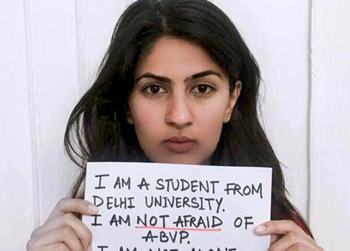May 1: India on Thursday called as "propaganda" certain social media posts from the Arab world alleging harassment of Muslims in several parts of the country in the name of containing the spread of coronavirus.
Strongly rebutting the charges, External Affairs Ministry Spokesperson Anurag Srivastava said the Gulf countries are deeply committed to friendly relations with India and they are even seeking bilateral talks on the post-COVID-19 economic recovery.
Talking about India's close and traditional ties with the Arab countries, he said New Delhi is ensuring uninterrupted supply of food and essential commodities to the region during Ramzan as part of its deep-rooted friendship.
Srivastava said the countries in the region do not support any interference in India's internal affairs.
"Much of what you see is propaganda by interested parties. Stray tweets can not be used to characterise our bilateral ties with these countries. The real picture of these relations is very much different," he said during an online media briefing.
There has been a wave of angry reactions on Twitter by leading citizens and rights activists from various Arab countries following allegations that Muslims are being blamed for spreading COVID-19 in several parts of India.
The Organisation of Islamic Cooperation, a powerful bloc of 57 countries, recently accused India of "Islamophobia". India rejected the charges as regrettable.
"We have been making special efforts to ensure uninterrupted supply of food and essential commodities which are required during the Ramzan period in these countries, and this is something which has been greatly appreciated. These countries also want a priority discussion with India on the post-COVID-19 economic recovery," Srivastava said.
Prime Minister Narendra Modi and External Affairs Minister S Jaishankar have been in regular touch with their counterparts from the region in the wake of the coronavirus pandemic.
"In these discussions, there have been requests for sending medicines and medical teams to these countries. We already deployed a Rapid Response Team in Kuwait. There is also a request to send doctors and nurses from India," said Srivastava.
"What comes out clearly is that these countries are deeply committed to friendly relations with India. They also do not support any interference in internal matters of India. It is, therefore, important that the friendly and cooperative nature of our relations is accurately recognised and the misuse of social media is not given credence," he added.
Asked about reports of an order issued by Oman's Finance Ministry asking all state-owned companies to replace foreign workers with qualified local Omanis, Srivastava said it is not aimed at Indians working in the Gulf nation.
"The policy is a decades-old one and not specific to India. It does not target the Indians in any way," he said.
There have been apprehensions that the order will render thousands of Indians working in state-run firms in Oman jobless.
"They greatly value relationship with India. Government of Oman is taking special care of Indians which included free testing for coronavirus, its treatment, providing food," the MEA spokesperson said.
Oman government is also extending certain categories of visas of Indians.
Srivastava said India has been in touch with its friends and partners across the world as part of the collaborative approach to dealing with the pandemic.
 Lady Sri Ram Ram College student Gurmehar Kaur, daughter of Kargil martyr Captain Mandeep Singh, said she has attracted a barrage of hate messages over her stand on the issue.
Lady Sri Ram Ram College student Gurmehar Kaur, daughter of Kargil martyr Captain Mandeep Singh, said she has attracted a barrage of hate messages over her stand on the issue.




Comments
Is ABVP rapist parishath....they should change their name to ABRP.....
Rape threat given by ABVP Shows ...... their impotency ...
Fantastic ABVP, That means any time these Goons can do anything, their understanding is totally wrong Shobakka see what your Criminal Looter Gang doing, I understand they are Rape less party but now!!! do you have to have any Experience??????
because YEDDIANNA Champion in this case!! this is what last week our greatest Leader Kerala CM Master Blasted to RSS, see you all Bull of the Gate.
Jai hoo Siddaramanna.
what can we expect from ABVP, RSS and all.. who are all outcomes of rape and are picked from gutter... these b@#$%^! abandoned by their parents
Add new comment